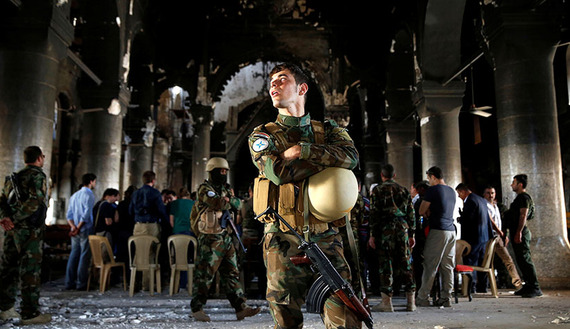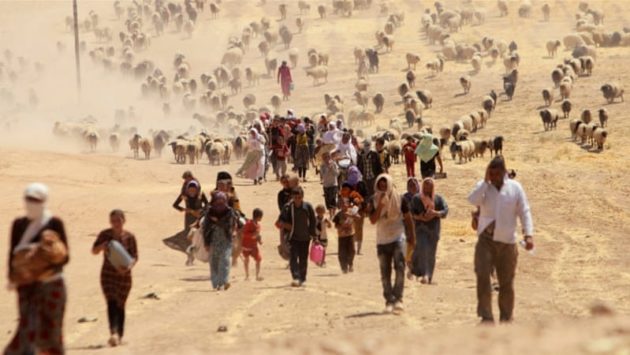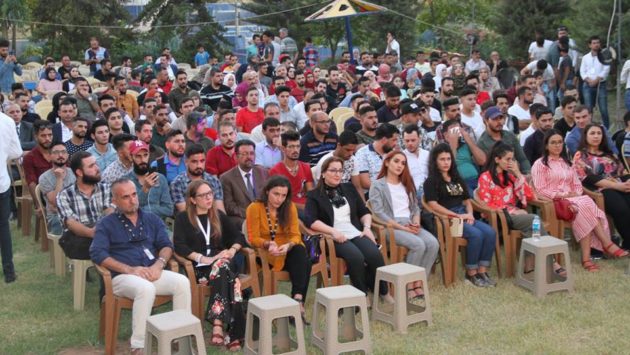Do Minorities Have Role in Iraqi National Reconciliation?

BAGHDAD — Al-Monitor
By: Saad Salloum
The national settlement document, which put forward a project for national reconciliation, is facing some difficulties that seriously threaten the possibility of establishing this project. The main issue is that this national settlement is limited to the large groups in Iraq — Sunnis, Shiites and Kurds — while it excludes civil society as well as ethnic and religious minorities.
Iraqi parliament Speaker Salim al-Jabouri announced Dec. 13 that the Sunni blocs in the parliament have prepared their own version of the national settlement. The predominantly Shiite National Alliance announced recently the “historical settlement” document, in order for it to be a final agreement for the post-Islamic State (IS) phase. But in late November, the parliament passed the Popular Mobilization Units law, leading the Sunni blocs that opposed the legislation to withdraw from the reconciliation process and prepare a new version of it. Kurds also are expected to prepare their own version. What is missing here are the voices of smaller Iraqi minorities and nonsectarian entities such as civil society.
Yonadam Kanna, the secretary-general of the Assyrian Democratic Movement and a member of the Iraqi parliament, told Al-Monitor that he objects to the settlement document. “Do Christians and other minorities have a say in drafting or even making suggestions for any national settlement?” he asked. “All political settlements are always made between major ethnic groups, according to their own interests, while ignoring those of minorities.”
For instance, Kanna noted how the national settlement does not include one clause or item determining the fate of the disputed minority areas between the Kurds and Arabs, such as Sinjar for the Yazidis, Tal Afar for the Turkmens and the Ninevah Plains for the Christians and Shabaks. He added, “Minorities do not have a say in this and they are not even allowed to determine their own fate. The settlement does not take into account the views of Christians or Yazidis or any other less influential minority groups.”
Kanna had previously criticized the national reconciliation projects put forward by the larger groups due to their failure to provide clear guarantees to bring the criminals who committed massacres against minorities such as Yazidis, Christians and others to justice.
Iraqi civil society — much like the representatives of minorities — is concerned about the settlement project, which involves the redistribution of power and privileges between the political leaders of the three main groups, as if recreating the sectarian regime of 2003.
Hanaa Edwar, the head of the Iraqi Al-Amal Association, believes that it is difficult to produce a national settlement put forth by political elites who are part of the problem and among whom corruption prevails.
She told Al-Monitor that ideas for reconciliation should come from a cross-sectarian grouping such as civil society, which does not have a direct interest in power or is not locked in conflict over it; she said this grouping could also be formed by minorities that lack protection and that are not active political participants.
Other objections focused on how some Iraqi society groups are marginalized and have not been included in the process of reaching a vision for a comprehensive settlement.
Hisham al-Suhail, the chairman of the National Reconciliation Commission in the Iraqi parliament, said he objected to the commission’s lack of involvement in drafting a document of national reconciliation. He told Al-Monitor, “We were invited to a meeting of the National Alliance, and the draft was read and put to a vote, but we did not have a role in drafting it ourselves.”
Suhail said, “The document’s main weakness lies in announcing it on behalf of the National Alliance. Meetings should have been held by representatives of the Shiites and Sunnis to openly discuss the reconciliation, a draft of which should have been the result of dialogue. However, the fact that it was announced by the National Alliance made it seem as if it were a Shiite vision, which would be confronted by a Sunni vision — both in form and substance — and perhaps be followed by a Kurdish vision later on.”
He also pointed to the importance of involving unofficial social forces such as tribes that are cross-sectarian by nature, pointing out that his tribe, al-Tamim, includes both Shiites and Sunnis.
He explained that if such social forces are not included, the reconciliation would be a disappointing political settlement that would never turn into a comprehensive process that includes social forces along with political forces. Such a comprehensive process, he said, could lead both the state and the community to well-being and safety.
It seems that the settlement process has faced other challenges, which might have doomed it to failure even before its launch.
Ahmed al-Masari, the head of the Iraqi National Forces Alliance, spoke about an important timing issue in the framework of the negotiations over the national settlement document.
He told Al-Monitor, “The National Alliance presented the settlement document to the United Nations Assistance Mission for Iraq [UNAMI] and the head of UNAMI Mr. Jan Kubis was scheduled to deliver it to the Iraqi National Forces Alliance. However, the Popular Mobilization Units [PMU] law was approved by the parliament despite our opposition, so as a response, we refused to accept the settlement.”
Masari added, “Had the PMU law been approved a day later, we would have received the document according to plan,” explaining that his bloc had previously stressed that “the PMU law was a fatal sectarian blow against the state.”
But Hussein al-Adli, the adviser to the Implementation and Follow-up Committee for National Reconciliation associated with Prime Minister Haider al-Abadi, and who participated in drafting the national settlement document, dismissed the objections to the document, saying, “National settlement is not an option but an absolute necessity for any conception of an Iraqi state in the post-Islamic State phase.”
He added, “Although the National Alliance was the one that presented the national settlement, it does not necessarily represent an exclusive Shiite vision. This document was the result of long and thorough discussions between experts, independent political parties and members of Shiite parties along with United Nations officials. This settlement is not exclusive to one political current or person.”
The truth is that the difficulties that the national settlement faces reflect the true concerns about a conflict in the post-IS phase, which seem quite dangerous in the absence of a unified national vision to establish comprehensive reconciliation.




